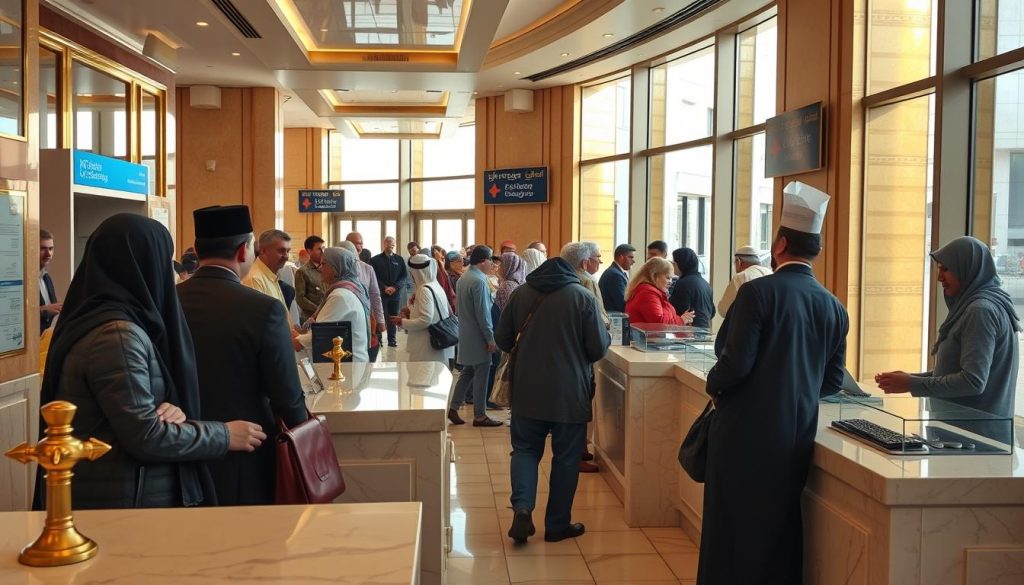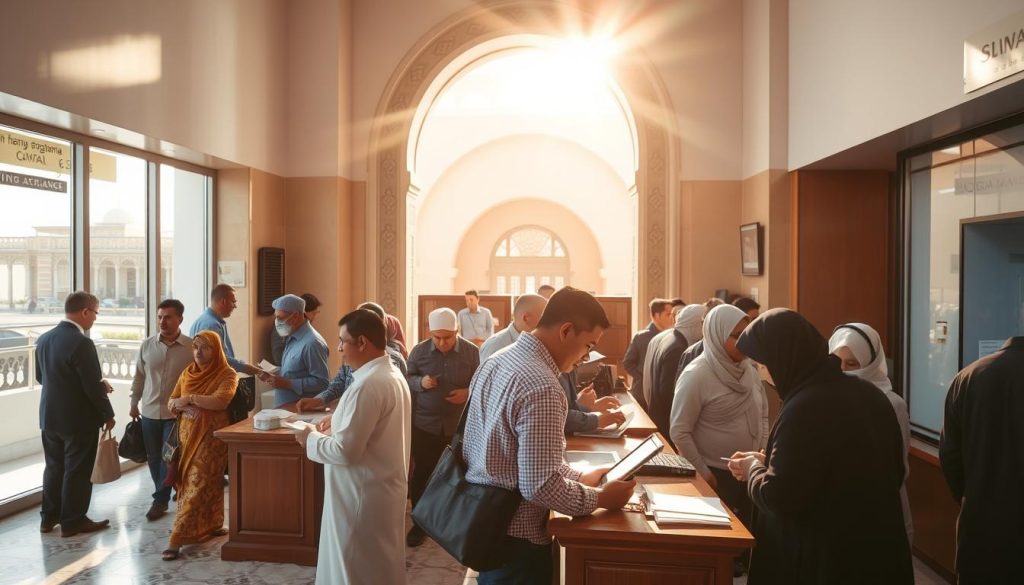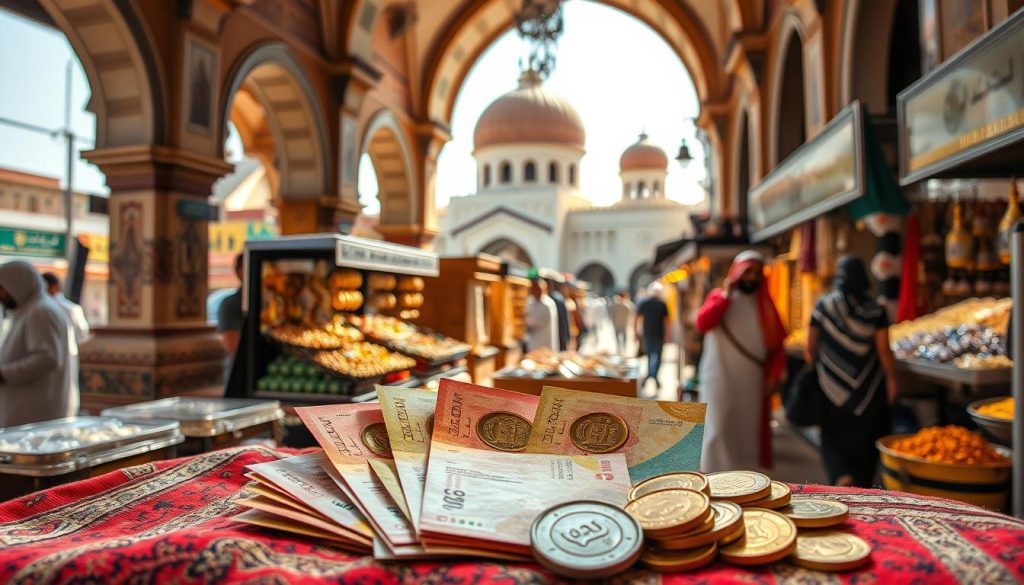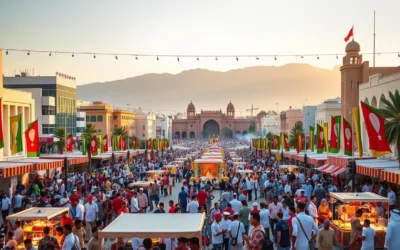✓ Accommodations ✓ Flights ✓ Rental Cars ✓ Tours & Activities
Did you know that the Omani Rial (OMR) is one of the strongest currencies in the world? With 1 OMR equaling approximately 2.60 USD, understanding how to manage your money during your trip is crucial. This guide will help you navigate exchange rates, avoid hidden fees, and make the most of your travel budget.
Planning your finances ahead of time can save you both time and money. Knowing the mid-market rate ensures you get the best value when converting your currency. Whether you’re using a card or cash, comparing exchange options can help you avoid unnecessary costs.
This guide covers everything from the benefits of using travel cards to tips for handling cash. Keep reading to discover how to make your trip smoother and more cost-effective.
Understanding Currency Exchange in Oman
Understanding how currency exchange works can save you money and stress during your travels. Whether you’re converting USD to OMR or using a card, knowing the basics ensures you get the best value for your money.

Mid-Market Rate Explained
The mid-market rate is the rate banks use when trading currencies. It’s the fairest benchmark for exchange rates, but most providers add a markup to make a profit. For example, if the mid-market rate for USD to OMR is 0.38, you might see a rate of 0.36 at an exchange bureau.
Airports and tourist areas often have higher markups. Comparing rates before you exchange can help you avoid unnecessary costs. Always check the mid-market rate using reliable tools or apps.
Factors Affecting Exchange Rates
Several factors influence exchange rates, including market fluctuations and provider markups. Economic conditions, political stability, and global events can cause rates to change daily.
- Market Fluctuations: Supply and demand for a currency can cause rates to rise or fall.
- Service Provider Markups: Banks and bureaus often add fees or markups to the mid-market rate.
- Location: Rates at airports or tourist spots are usually less competitive.
By understanding these factors, you can make informed decisions and get the best value for your money.
Oman: Ultimate Travelers Guide to Currencies & Payments
When planning your trip, having the right mix of payment options is essential. This guide ensures you’re well-prepared with the local currency (OMR) and a balance of cash and card choices. Being familiar with the Omani Rial and its value against the USD can help you make smarter financial decisions.

Comparing exchange rates is a simple yet effective way to save money. Whether you’re converting USD to OMR or using a card, knowing the mid-market rate ensures you get the best deal. Avoid high markups by checking rates before exchanging your currency.
This guide is designed for all types of travelers, whether you’re on a budget or planning a mid-range trip. It provides valuable insights into managing your finances efficiently. From understanding the local currency to choosing the right payment methods, you’ll find everything you need to make your journey smoother.
Think ahead about your payment options and financial planning. Having a mix of cash and card ensures you’re ready for any situation. With the right preparation, you can focus on enjoying your trip without worrying about unnecessary costs.
Pre-Trip Currency Preparation and Travel Money Tips
Smart money planning before your trip can save you time and unnecessary costs. Preparing your finances in advance ensures you’re ready to handle expenses without stress. This section covers how to exchange USD for OMR and avoid common pitfalls like airport scams.
Exchanging USD for OMR in Advance
Exchanging your currency before you travel is a smart move. Local banks and trusted providers often offer better exchange rates than airport kiosks. For example, converting USD to OMR at your bank can save you from high markups and hidden fees.
Here’s why pre-exchange is beneficial:
- You secure a better exchange rate compared to last-minute options.
- It eliminates the hassle of finding a reliable service upon arrival.
- You can budget more effectively by knowing exactly how much money you have.
Avoiding Airport Currency Scams
Airport exchange counters are convenient but often come with higher costs. These kiosks take advantage of their captive market by adding extra markups. To avoid this, compare rates from local banks or online platforms before your trip.
Here are some tips to save money:
- Research exchange rates online to know the fair market value.
- Use trusted providers like Wise for competitive rates.
- Avoid exchanging large amounts at airports or hotels.
| Exchange Option | Pros | Cons |
|---|---|---|
| Local Bank | Better rates, lower fees | Requires advance planning |
| Airport Kiosk | Convenient | Higher markups, hidden fees |
| Online Provider | Competitive rates, easy to use | May require account setup |
By planning ahead, you can avoid unnecessary costs and focus on enjoying your travel. Whether you’re using a card or cash, being prepared ensures a smoother experience.
Payment Options and Handling Cash in Oman
Managing your money efficiently while traveling can make your trip stress-free. Knowing the best payment methods ensures you’re prepared for any situation. Whether you’re using a credit card, debit card, or cash, understanding the pros and cons of each option is essential.

Using Travel Debit and Credit Cards
Travel cards, like those from Wise, are a convenient and secure way to make transactions. They often offer low conversion fees and transparent pricing, making them ideal for frequent travelers. Debit cards linked to travel accounts can also help you avoid high foreign transaction fees.
Here’s why travel cards are beneficial:
- They provide competitive exchange rates compared to traditional banks.
- You can easily track your spending through mobile apps.
- They’re widely accepted at hotels, restaurants, and major retailers.
When to Use Cash Over Card
While cards are convenient, having some cash on hand is practical for smaller purchases and tipping. Many local vendors, taxis, and smaller establishments prefer cash payments. It’s also useful in areas where ATM withdrawal options are limited.
Here are scenarios where cash is ideal:
- Small purchases at local markets or street vendors.
- Tipping service staff or drivers.
- Areas with limited card acceptance or unreliable card machines.
By balancing your use of cards and cash, you can handle expenses smoothly and avoid unnecessary fees. Planning ahead ensures you’re ready for any payment situation during your trip.
Budgeting Your Trip: Costs and Spending in Oman
Planning your trip budget carefully can make your journey more enjoyable. Understanding the cost of accommodation, food, and transportation helps you avoid overspending. This section provides practical tips to manage your daily expenses and make the most of your money.

Accommodation and Food Costs
Accommodation costs vary depending on your preferences. Budget hotels start at around $28 per night, while mid-range options average $65. Luxury stays can go up to $127 per night. For food, budget meals cost about $37 daily, while mid-range dining averages $84. If you’re splurging, expect to spend around $161 per day on meals.
Here’s a quick breakdown:
- Budget hotel: $28/night
- Mid-range restaurant: $84/day
- Luxury dining: $161/day
Local Transportation and Attractions
Getting around is affordable, with daily transportation costs averaging $68. Renting a car costs about $40 for a saloon car or $95 for a 4×4. Entrance fees for attractions range from $3 to $5, though many sights are free. Plan your itinerary to balance paid and free experiences.
Managing Daily Expenses
Setting up a travel account helps you track spending. Apps like Wise or Revolut offer real-time updates on your budget. Always carry some cash for small purchases, like street food or tips. A 10-15% tip is customary in restaurants.
Here are some tips to stretch your money:
- Use public transport or shared rides to save on costs.
- Shop at local markets for affordable snacks and souvenirs.
- Choose free attractions like mosques and natural sites.
By planning ahead and monitoring your account, you can enjoy your trip without financial stress.
Securing Your Money: ATM Withdrawals and Card Safety
Keeping your money secure while traveling is a top priority. Whether you’re withdrawing cash or using your debit card, understanding how to protect your funds ensures a stress-free experience. This section provides practical tips for safe atm withdrawals and avoiding hidden fees.
Tips for Safe ATM Withdrawals
Using atms abroad can be convenient, but it’s essential to stay vigilant. Here are some tips to ensure your withdrawals are secure:
- Choose atms in well-lit, secure locations, such as banks or shopping centers.
- Cover the keypad when entering your PIN to prevent theft.
- Monitor your transaction alerts to spot any unauthorized activity.
- Avoid using standalone atms in remote or poorly monitored areas.
- Carry a backup debit card in case of emergencies.
Understanding Fees and Hidden Charges
Hidden fees can quickly add up during international transactions. Here’s how to avoid unnecessary charges:
- Check your bank’s foreign transaction and atm withdrawal fees before traveling.
- Opt for atms that are part of your bank’s network to reduce fees.
- Decline dynamic currency conversion (DCC) to avoid inflated exchange rates.
- Use apps or online tools to compare atm fees in your destination.
- Set a daily withdrawal limit to control your spending and reduce risk.
By following these tips, you can manage your money safely and avoid unexpected charges. Staying informed and prepared ensures a smoother financial experience during your travels.
Traveler Tips for a Smooth Currency Conversion Experience
Managing your finances while traveling doesn’t have to be complicated with the right tools. Digital solutions and apps can simplify currency conversion, making it easier to handle your money abroad. Whether you’re using a travel card or monitoring exchange rates, these tools save both time and costs.
Leveraging Digital Tools and Apps
Modern financial technology offers a range of options to streamline your travel finances. Apps like Wise and Revolut provide real-time conversion rates and low fees. These tools are especially useful for frequent travelers who need to manage multiple currencies.
Here’s how digital tools can help:
- Track exchange rates in real-time to find the best option.
- Use a multi-currency card to avoid high foreign transaction fees.
- Monitor your spending through user-friendly mobile apps.
Reputable providers like Wise offer multi-currency accounts, allowing you to hold and convert funds in various currencies. This flexibility ensures you’re always prepared, no matter where your travels take you.
| Tool | Features | Benefits |
|---|---|---|
| Wise | Multi-currency account, low fees | Competitive exchange rates, easy tracking |
| Revolut | Real-time rates, budgeting tools | Convenient, secure transactions |
| XE Currency | Exchange rate alerts, offline mode | Reliable, user-friendly |
By leveraging these tools, you can manage your finances efficiently and focus on enjoying your trip. Whether you’re converting currency or using a card, these solutions make travel budgeting stress-free.
Conclusion
Handling your finances effectively during your trip ensures a smoother experience. By focusing on the exchange rate, using the right card, and managing cash wisely, you can avoid unnecessary fees and save money.
Pre-trip planning is key. Compare rates and choose trusted providers to get the best value. Whether you’re making a payment or withdrawing cash, staying informed helps you make smarter decisions.
Remember to keep an eye on hidden charges and use tools like Wise for transparent transactions. With these tips, you can focus on enjoying your travel without financial stress.
The above is subject to change.
Check back often to TRAVEL.COM for the latest travel tips and deals.
Here are some Tours & Sightseeing suggestions that might pique your interests!






